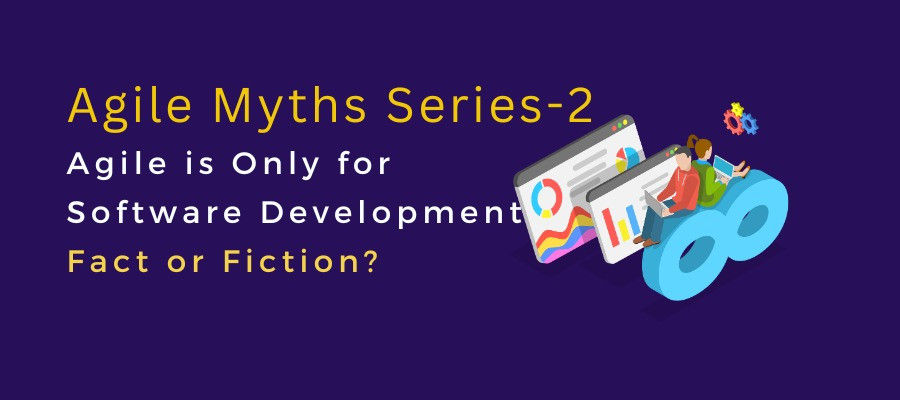Agile Myths Series 2: Is Agile Only for Software Development? Fact or Fiction

Welcome back to the second topic of Agile Myths Uncovered! This week, we're tackling a widespread misconception that limits Agile’s potential: the belief that Agile methodologies only apply to software development. Many people think Agile is solely for IT projects. This belief can limit opportunities to enhance productivity and adaptability in various fields. But that’s far from the actual truth. So, let's debunk this myth and explore how Agile principles can be applied beyond software development.
The Myth: Agile Is Only For Software Development
The belief that Agile methodologies, including Scrum, Kanban, and Lean, are exclusive to software and IT projects is pervasive. Many Agile beginners and even experienced Agile practitioners often fall into this trap. The idea stems from Agile’s origins in software development. The Agile Manifesto was created by software developers for software projects, leading many to believe it can't be applied elsewhere.
The Reality: Agile Is A Versatile Mindset
Agile is a mindset that covers twelve principles that focus on delivering value to the customer. These principles can be applied to any project requiring flexibility and iterative progression. Many industries other than IT successfully implement Agile Principles to boost operational efficiency. We’ll discuss them in a bit!
Why This Myth Persist?
Origins in Software: The Agile Manifesto and early Agile frameworks were developed for software projects. This historical context explains why people associate Agile solely with software.
Technical Language: Agile methodologies often use specific terms, such as "Sprints" and "Product Backlogs," directly related to software development.
Lack of Awareness: Many must know that Agile can be adapted to other fields.
Applying Agile Beyond Software: Let’s Proof The Myth Wrong With Facts!
Beyond software development in IT, let’s find suitable industries that can utilize Agile Methodologies like Scru, Kanban, or XP to enhance their business operations!
Marketing
Agile principles can revolutionize marketing campaigns. Marketing teams can use Agile to manage their projects more effectively. By breaking down large campaigns into smaller, manageable tasks, teams can respond to feedback quickly and adapt to changing market conditions.
Sprints: Plan and execute marketing campaigns in short, iterative cycles.
User Stories: Focus on customer needs and create targeted marketing messages.
Scrum Team: A cross-functional team including marketers, designers, and copywriters.
Finance
Agile principles can transform the finance industry by improving processes such as financial planning, regulatory compliance, and customer service.
Sprints: Plan and execute financial reviews, audits, and regulatory compliance checks in short, iterative cycles.
User Stories: Focus on customer needs to develop financial products and services that add value.
By using Agile, finance teams can quickly adapt to regulatory changes and market fluctuations to remain compliant and responsive to customer needs.
Human Resources
Human Resources (HR) can benefit from Agile methodologies. Agile HR focuses on improving employee engagement, recruiting, and training processes.
Scrum Training: Implement Scrum to manage recruitment drives or training programs.
Workshops: Ask the employees to attend the Agile Workshops to gather knowledge.
Incremental Improvements: Continuously improve HR processes based on feedback.
Product Development
Agile principles can enhance product development processes outside software. Physical products, services, and innovations can all benefit from Agile methodologies.
Product Backlog: Maintain a list of features or improvements for your product.
Sprint Backlog: Focus on the most critical tasks for the next development cycle.
Release Planning: Plan product releases in short, iterative cycles to gather customer feedback early.
Healthcare
Healthcare providers can utilize Agile methodologies to improve patient care, streamline administrative processes, and adapt to regulatory changes.
Sprints: Plan and execute patient care plans, medical research projects, and quality improvement initiatives in short cycles.
User Stories: Focus on patient needs to develop care plans and health services that enhance patient outcomes.
Thus, Agile Practices enable healthcare organizations to quickly adapt to new medical advancements and regulatory requirements to improve patient care and operational efficiency.
What Are The Benefits Of Applying Agile Across Industries?
Efficient Team Collaboration: Agile motivates the Scrum Team, Developers, and other team members to communicate accurately with stakeholders about the project’s progress.
Adaptability: Agile frameworks enhance a team's ability to adapt to changes. Agile teams can pivot quickly when responding to changing markets or customer expectations.
Business Transformation: Agile helps teams transform their processes to become more efficient and responsive. This principle applies to any industry and can significantly enhance processes and outcomes.
Conclusion:
Hopefully, we will all agree that Agile is for more than just software development. It is a versatile mindset that can enhance business operations with smooth team collaboration and fast change adaptability.
So, you can apply the Agile principles across different industries to unlock new levels of productivity and value in your projects, whether in marketing, HR, product development, or any other field!
Reference:
https://www.scrum.org/resources/blog/agile-just-software-and-other-scrum-myths
https://www.linkedin.com/pulse/agile-myths-2-only-software-development-rizvi-zaveri-imq1f/



